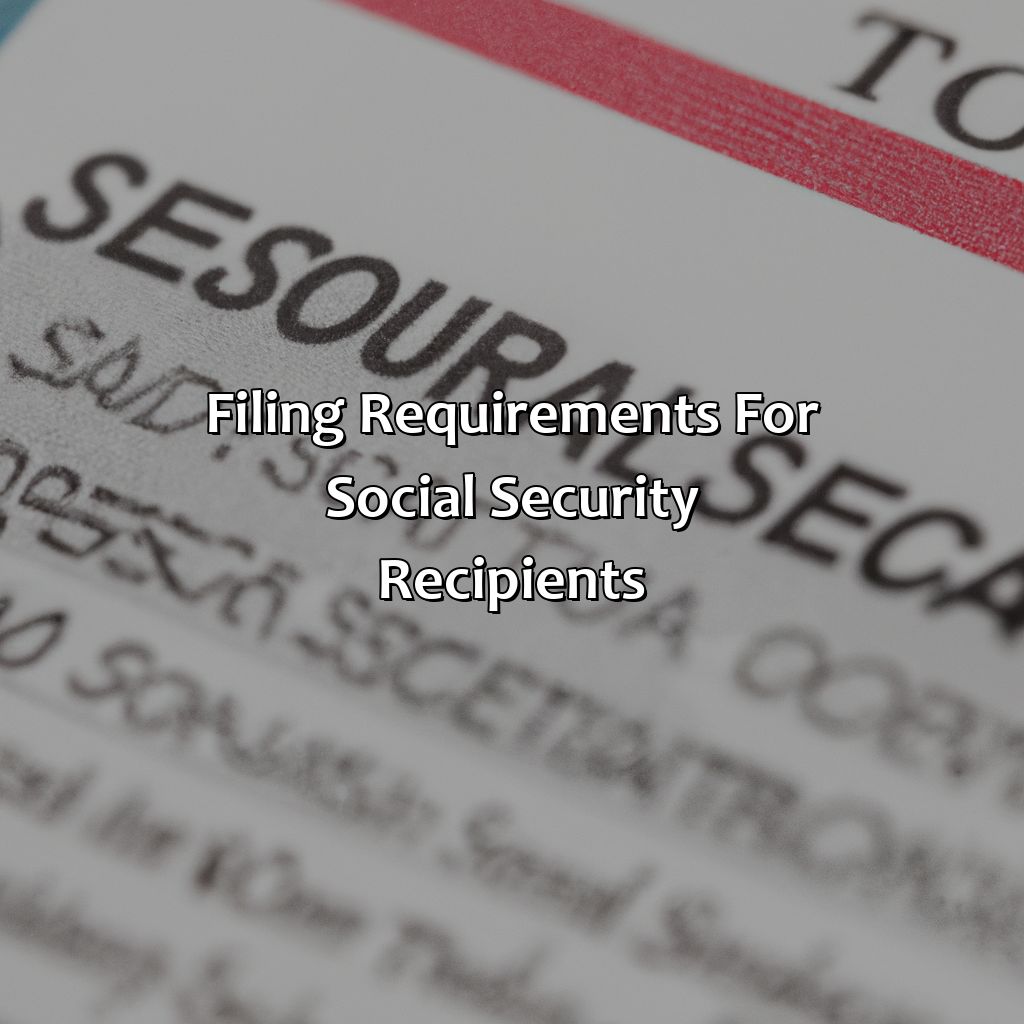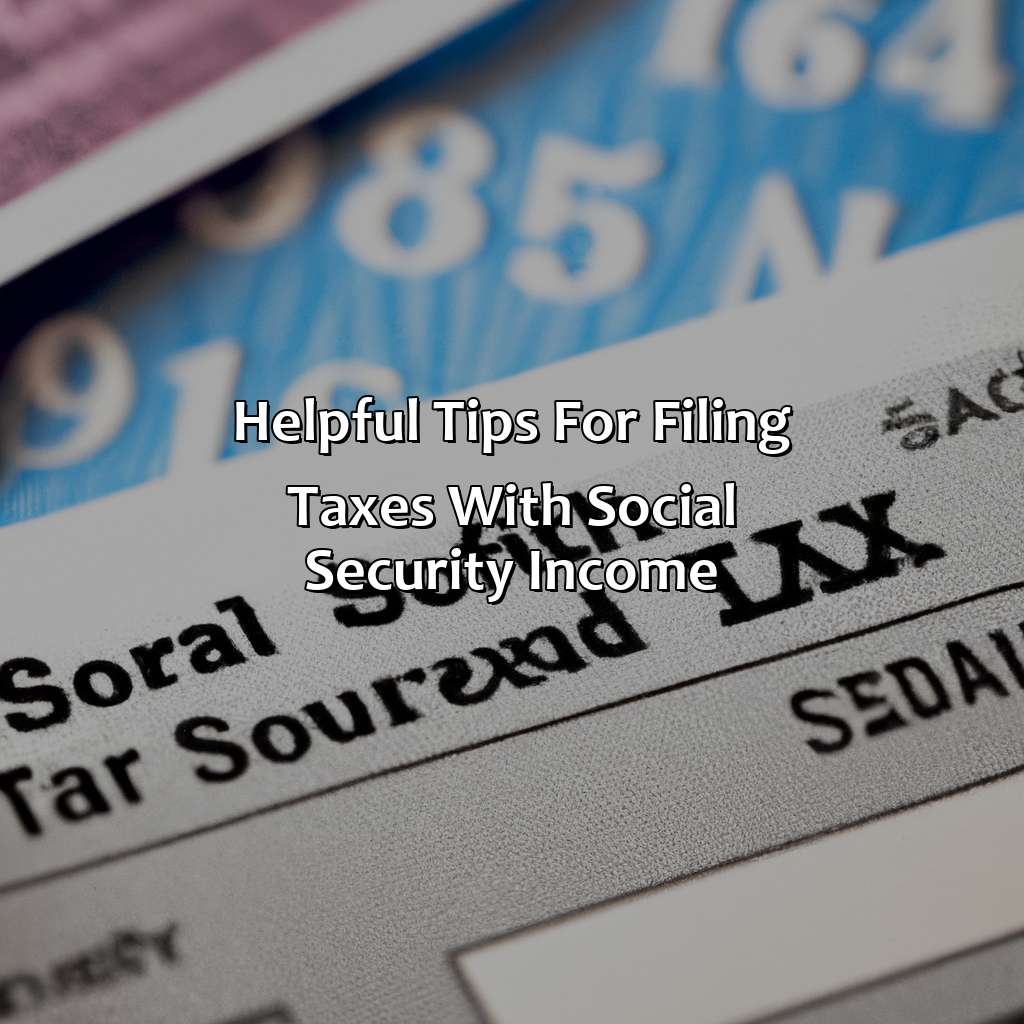What Tax Form Do I Use If My Only Income Is Social Security?
Key Takeaway:
- Form SSA-1099 is issued by the Social Security Administration and provides information on the total amount of benefits received in a year, which is required for tax purposes.
- Income thresholds and age requirements determine whether or not a social security recipient needs to file taxes. Individuals who earn more than $25,000 ($32,000 for couples) and those who file as head of household and earn more than $25,000 need to file taxes.
- Social security recipients can use Form 1040 or Form 1040-SR to file taxes, depending on their age and filing status.
- It may be beneficial to hire a tax professional to ensure that all deductions and credits are taken, and to be aware of state tax laws and how they apply to social security income.
Filing taxes can be daunting for seniors relying on Social Security as their only source of income. You may be wondering which form to use when filing taxes. Our guide will help you understand the tax forms needed for Social Security income.
Tax Forms for Social Security Income
Social Security Income: Which Tax Form Should You Use?
If Social Security Income is your only source of income, you may wonder which tax form to use. In this case, the important tax forms to consider are Form 1040 or Form 1040-SR. These forms are used to report taxable income, including Social Security benefits.
The right form for you to use depends on your specific circumstances. If your income consists solely of Social Security benefits and your gross income doesn’t exceed the IRS’s threshold, you may not need to file a federal income tax return. However, if you receive other sources of income besides Social Security benefits or your income exceeds the threshold, you will likely need to use Form 1040 or Form 1040-SR.
It’s essential to note that taxes on Social Security benefits depend on the total amount of income you receive. If your combined income exceeds a certain limit, you may end up owing taxes on a portion of your Social Security benefits.
To avoid potential penalties and interest, it is crucial to file your taxes correctly and on time if you are required to do so. Don’t risk missing out on important deductions and credits that could reduce your tax liability.
If you’re still unsure which tax form to use, consulting a tax professional or using tax software can help you determine the best option for your situation. Don’t let the fear of making mistakes hold you back from fulfilling your tax obligations and securing your financial future.

Image credits: retiregenz.com by Yuval Washington
Form SSA-1099 and Its Purpose
Form SSA-1099: Purpose and Use
In order to report their Social Security income, taxpayers are required to use Form SSA-1099, which is provided by the Social Security Administration (SSA). It is a tax form used to report various types of income received from Social Security, including retirement, survivor, and disability benefits. The form is required even if the taxpayer did not receive any other income throughout the year.
To fill out the form, taxpayers need to refer to the figures provided in Box 5, which displays the total amount of benefits received during the year. Box 4 contains any amount of federal income tax withheld from their Social Security income. The amount reported in Box 5 is to be reported on Line 6a of Form 1040 or Form 1040-SR.
It is important to note that not all Social Security income is taxable. The taxable amount is calculated using a formula that considers the total amount of benefits received in combination with any other income earned during the year. If the total income, including Social Security benefits, falls below the threshold, the benefits would not be taxable.
The form has been in use since 1984, and in 1997 it replaced the SSA-1099 and SSA-1042S, which were used for nonresident aliens. Since its implementation, the SSA has made several changes to the form’s design in an effort to make it easier to understand and use.

Image credits: retiregenz.com by James Jones
Filing Requirements for Social Security Recipients
File taxes right when your income is only Social Security? Understand the filing rules for recipients. Here we’ll give you tips. Learn about income thresholds and age rules for IRS regulations. Get more info on what applies to you.

Image credits: retiregenz.com by Adam Jones
Income Thresholds
For individuals on Social Security, Income Thresholds represent the minimum amount of earnings required to file a tax return. If a person’s only income is that from Social Security benefits, they may not need to file a tax return at all. However, if an individual earns above certain thresholds or has other forms of taxable income, filing requirements may apply.
As per the latest tax laws and regulations applicable in various jurisdictions, Income Thresholds for Social Security recipients depend on several factors such as marital status and age. For example, for married couples filing jointly who are both over 65 years old and receive $32,000 or less in combined gross income annually from sources other than Social Security benefits, they may not have to file taxes.
Moreover, it is essential to be aware of the additional rules that apply to your specific case. For example, if someone receives interest or dividends from investments or has earned wages in addition to their Social Security Benefits where their total annual income exceeds $25,000 (for single filers) or $32,000 (jointly) – they must file their taxes accordingly.
According to the Internal Revenue Service (IRS), more than eight million Americans do not pay federal income taxes owing to insufficient earnings each year.
At least reaching the age requirement for Social Security means you’re no longer questionable for a fake ID.
Age Requirements
When considering the eligibility criteria for filing taxes, age requirements play a crucial role. As per the rules set by the IRS, Social Security beneficiaries have to file returns when their gross income exceeds a specific amount based on age and filing status.
For instance, if you are single and your gross income (including half of your Social Security benefits) exceeds $25,700 in 2020, you must file your tax return irrespective of age.
Moreover, if you are married filing jointly and your combined gross income (including half of your Social Security benefits) is more than $32,000 in 2020 while below 65 years old, then you need to file the tax return. Similar rules apply to married couples above or equal to 65 years old where the threshold is slightly higher.
It is important to note that irrespective of whether you receive Form SSA-1099 from Social Security or not, it does not affect your tax liability as long as your gross income crosses the said threshold limit.
An interesting fact regarding age requirements for taxes is that up until 1983, only about half of beneficiaries paid federal taxes on their Social Security benefits. However, in an attempt to increase revenue and ensure solvency of SS program’s trust funds for longer periods, taxation on benefits was added as a part of the SS Reform Act introduced in 1983.
Tax time with Social Security income: it’s like trying to solve a Rubik’s cube with one hand tied behind your back.
Steps to File Taxes with Social Security Income
- Gather important documents
- Determine taxable income
- Choose the right tax form
- Understand the sub-sections briefly
When filing taxes with social security income, you will need to gather important documents such as your social security statement, W-2 forms, and 1099 forms. These documents will help determine your taxable income and ensure that you are filing the correct tax form.
Once you have gathered all of your important documents, you will need to determine your taxable income. Social security income may or may not be taxable, depending on your total income for the year. You can refer to the Social Security Administration’s website for more information on how to calculate your taxable income.
After determining your taxable income, you will need to choose the right tax form for your situation. Most individuals filing taxes with social security income will use Form 1040 or Form 1040-SR. These forms are designed for seniors and provide added features, such as larger font sizes and a chart for calculating the standard deduction.
The tax forms may have different sub-sections, such as itemized deductions or credits for the elderly or disabled. It is important to understand these sub-sections briefly so you can make informed decisions about filing taxes. The IRS website provides detailed instructions for each sub-section, and you can also seek help from a tax professional if needed.

Image credits: retiregenz.com by Joel Arnold
Gather Important Documents
The Essential Documents You Need to Gather Before Filing Taxes with Social Security Income
To file taxes with Social Security Income, it is important to have certain essential documents on hand. These include:
- Form 1099-SSA: This document shows the total amount of benefits received during the year and is required when filing taxes with Social Security income.
- W2 Forms: If you received any other form of income apart from your Social Security benefits, such as wages or salary, you will need W2 forms showing your total earnings for the year.
- Bank Statements: It’s important to gather bank statements that show interest earned if you have savings. The bank or financial institution will provide a statement showing earnings made over the course of the year automatically, which can be used to file taxes accurately.
- Social Security Card: Your social security card will be required as it contains your social security number (SSN) which will also be needed when filing taxes.
In addition to these common documents, there may also be other specific items that could be necessary depending on your individual circumstances regarding taxation and your state’s regulations.
Ensure accuracy by gathering all relevant information available before filing taxes with Social Security income.
Consider saving documents digitally in a secure location such as an online encrypted cloud service or stored on an external drive. This way, they are easily accessible in case of loss or damage. Ensure that all sensitive information is protected appropriately due to security concerns.
With these considerations in mind, taxpayers can file their taxes accurately with confidence while using their only income source of Social Security efficiently and avoid any mistake in the process.
Time to separate the ‘social’ from the ‘security’ and figure out what Uncle Sam wants in your wallet.
Determine Taxable Income
Determining the amount of Social Security income that is taxable can be a complex process. It depends on the combined income of the taxpayer and spouse, if applicable, as well as other sources of income. To accurately determine taxable income, taxpayers must follow specific guidelines provided by the Internal Revenue Service (IRS).
The IRS requires taxpayers with Social Security income to include a portion of it in their overall taxable income. This includes not only Social Security retirement benefits but also disability and survivor benefits. The amount of Social Security benefits included in taxable income depends on how much total combined income a taxpayer has.
In addition to Social Security, other sources of income may also be considered when determining taxable income. These may include pensions, annuities, interest, dividends, and capital gains from investments. Taxpayers should consult IRS publications or seek advice from a qualified tax professional to ensure all sources of taxable income are properly reported.
Pro Tip: While calculating taxable income can be confusing, correctly reporting all sources of income is crucial for avoiding penalties and audits. Consider seeking advice from a tax professional if you are unsure about your filing obligations or how to report certain types of income on your tax return.
Choosing the right tax form is like choosing the right outfit: it needs to fit you perfectly and not leave anything out.
Choose the Right Tax Form
Selecting the Proper Tax Form to File Social Security Income
Filing taxes can be daunting, especially for those solely receiving Social Security income. Filling out the appropriate tax form is essential to avoid errors and potential fines. Follow these six effective steps to ensure that you select and complete the correct tax form.
- Step 1: Determine if You Need to File Taxes – The first step is determining whether you need to submit a federal tax return.
- Step 2: Identify Your Taxable Income – Start by totaling your taxable income, including half of your Social Security benefits and any other earnings.
- Step 3: Select Your Tax Form – The IRS provides three different forms (1040, 1040A, and 1040EZ) based on filing status, taxable income, and eligibility.
- Step 4: Gather All Necessary Documents – Collect all necessary documents such as W2s and previous year’s returns.
- Step 5: Fill Out the Appropriate Form Accurately – After selecting the proper form, ensure that it is filled out correctly and accurately.
- Step 6: Submit Your Return – Once you have completed the form, verify everything for accuracy before filing.
It’s important to note that although Social Security benefits are not considered part of gross income in some situations, they may become taxable income. Consult with a professional or use IRS-provided calculators if necessary.
In a similar situation, a close acquaintance of mine had only received Social Security income but mistakenly filed using an incorrect tax form. This resulted in significant delays and penalties which could have been avoided with proper due diligence beforehand. Always confirm with resources or experts when unsure about any step in the process.
Filing taxes with social security income? Just remember, the IRS doesn’t accept hugs as a form of payment.
Helpful Tips for Filing Taxes with Social Security Income
Ready to file taxes with Social Security income? Our tips can help! Hire a tax professional? Check state laws? We’ve got the answers. Learn the benefits of each sub-section. Get ready to confidently tackle tax season this year!

Image credits: retiregenz.com by David Jones
Consider Hiring a Tax Professional
When it comes to filing taxes, considering a tax professional is highly recommended. Seeking advice from a financial expert can reduce the chances of missing out on potential deductions or credits. Hiring a knowledgeable and experienced tax professional can also provide clarity on your unique situation and help you navigate any changes to tax laws.
A qualified tax professional can ensure that your Social Security income is correctly reported and reflected in your taxes. They can also help with understanding the taxable portion of your benefits if applicable. By working with a tax professional, you will have peace of mind knowing that you are compliant with federal and state tax regulations.
It’s crucial to note that not all tax professionals are created equal, so be sure to research and select one who has experience in handling situations similar to yours. Some may specialize in specific areas such as retirement or disability income taxation and may add more value.
Better check those state tax laws before you end up owing more than you made on social security.
Be Aware of State Tax Laws
Knowing the Tax Laws of Your State
It’s essential to be familiar with your state’s tax laws when it comes to filing taxes with social security income. Some states exempt social security benefits entirely, while others have different rules and regulations. You do not want to get caught off guard by a tax bill because you failed to pay attention to state tax laws.
Each State is Unique
Every state has its guidelines for taxing Social Security income, and they differ significantly from one another. Some states tax benefits based on the same rules as federal taxes, while others provide tax exemptions based on age or income thresholds. Therefore, thoroughly researching your specific state tax requirements is critical in avoiding potential penalties or late fees.
Stay Alert for Changes
State and local tax laws can change at any time, so it’s vital to stay up-to-date regarding these changes. Keeping updated with potential modifications enables you to maximize your entitlements and could also save you money in the long run.
A Real-Life Experience
One of our clients assumed they were exempt from all taxes on their Social Security payments after relocating from one state to another after their retirement – unaware that they now resided in a taxation-based state. Fortunately, we advised them about their obligation to file taxes within specific deadlines and steps he needed for doing so correctly. His situation was sorted by taking care of his new residence taxes on time without any next-level issues.
Five Facts About What Tax Form to Use if Your Only Income is Social Security:
If your only income is social security, you may not need to file a tax return at all. (Source: IRS)
If you do need to file a tax return, you can use Form 1040 or Form 1040-SR. (Source: IRS)
You will only need to pay taxes on your social security income if your total income exceeds a certain threshold. (Source: AARP)
Depending on your state of residence, you may also need to file a state tax return. (Source: TurboTax)
The deadline to file your tax return is typically April 15th each year, but this may be subject to change. (Source: IRS)
FAQs about What Tax Form Do I Use If My Only Income Is Social Security?
What tax form do I use if my only income is social security?
If your only income is your social security benefits, you may not need to file a federal income tax return. However, if you have other sources of income, then you may need to file a return using Form 1040 or 1040-SR, even if your only income is Social Security.
Do I have to pay taxes on my social security income?
It depends on your total income. If your combined income (which includes your social security benefits and any other income you may have) is above a certain threshold, then you may owe taxes on your social security benefits. The taxability of Social Security benefits is based on a formula that takes into account your income level.
What is the threshold for paying taxes on social security benefits?
The threshold for paying taxes on social security benefits depends on your filing status. For example, if you are single and your combined income is between $25,000 and $34,000, you may owe taxes on up to 50% of your benefits. If your combined income is above $34,000, then you may owe taxes on up to 85% of your benefits. The thresholds are different for married couples filing jointly and for those filing separately.
What if I received social security but didn’t get a Form SSA-1099?
If you did not receive a Form SSA-1099, you can request one by contacting the Social Security Administration at 1-800-772-1213. You can also download a replacement SSA-1099 form from the SSA website.
Can I e-file my tax return if my only income is social security?
Yes, you can e-file your tax return even if your only income is social security benefits. The IRS accepts electronic filing for all types of tax returns, including Form 1040 and 1040-SR.
Do I need to report my social security income on my state tax return?
It depends on the state where you live. Some states do not tax social security benefits, while others do. Check with your state’s tax agency to see if you need to report your social security income on your state tax return.
 Checkout this IRS Loophole
Checkout this IRS Loophole 
